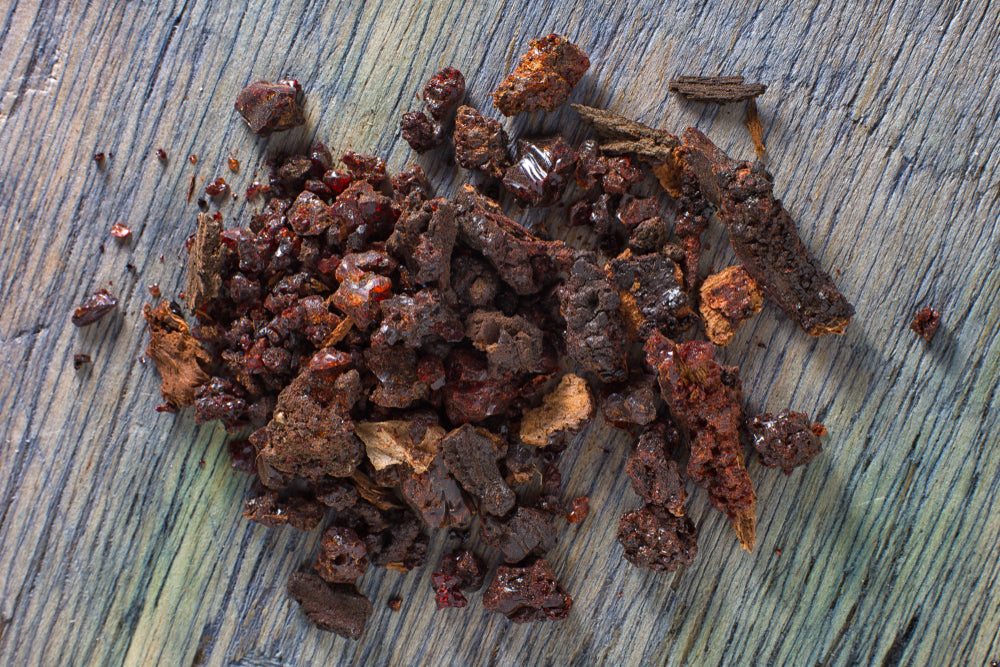What is Myrrh Essential Oil made of?
Myrrh Essential Oil is derived from the resinous sap of the Commiphora myrrha tree. This unique tree grows predominantly in the arid regions of the Middle East and North-Eastern parts of Africa, specifically in countries like Somalia, Ethiopia, Sudan, and Saudi Arabia.The valuable properties of Myrrh Essential Oil can be credited to its principal compounds such as terpenoids and sesquiterpenes, renowned for their anti-inflammatory and antioxidant effects.
- Latin Name: Commiphora myrrha
- Main Country of Origin: Somalia
- Scent Note Type: Base note with a warm, earthy, and woody aroma
- Most Popular Usage: Aromatherapy and Traditional Medicine
What are the benefits of using Myrrh Essential oil?
Myrrh Essential Oil presents several potential benefits:- Anti-inflammatory- It helps to reduce inflammation and swelling.
- Antioxidant- It can protect your body from damage by neutralizing free radicals.
- Antimicrobial- It has the ability to fight against bacterial and fungal infections.
- Immune Booster- It can help to stimulate the immune system.
How to use Myrrh Essential Oil?
- Aromatherapy: Add a few drops to a diffuser to create a calming and soothing environment.
- Topical Treatment: Dilute with a carrier oil and apply it to your skin for its antimicrobial and anti-inflammatory benefits.
- Mouthwash: It's traditionally been used in oral care for its antimicrobial properties.
How to combine Myrrh Essential Oil with Carrier Oils
Common carrier oils used with myrrh essential oil include jojoba oil, almond oil, and coconut oil. You can mix 2-3 drops of Myrrh Essential Oil with a tablespoon of your chosen carrier oil.
To create a diffuser blend, add 4-5 drops of Myrrh Essential Oil to the recommended amount of water in your diffuser.
Research based on Myrrh Essential Oil
"Anticancer and Antimicrobial Potential of Plant-Derived Natural Products." (2011, ncbi.nlm.nih.gov): The study suggests that Myrrh has potential antimicrobial and anticancer properties.
"Commiphora myrrha Resin from the Wild Trees of Eastern Ethiopia." (2018, researchgate.net): This report provides an in-depth overview of the harvesting, distribution, and traditional uses of Myrrh.
"Traditional Uses, Phytochemistry and Pharmacology of Commiphora myrrha." (2015, sciencedirect.com): The study offers a comprehensive review of the pharmacological potential of Myrrh including its anti-inflammatory, antioxidant, and antimicrobial effects.
Frequently Asked Questions
Q: Is Myrrh Essential Oil safe for all skin types?
A: Yes, but it should always be diluted with a carrier oil. A patch test is recommended for first-time users.
Q: Can I ingest Myrrh Essential Oil?
A: No, Avivni's Myrrh Essential Oil is intended for topical and aromatic use only.
Q: Is Myrrh Essential Oil safe for pets?
A: Cats and dogs are very sensitive to essential oils and many are even harmful or poisonous to them. Diffusers for aromatherapy should be placed high up and not near food and water bowls. There are products especially formulated for pets that have been vetted for safety and diluted to the appropriate strength and we suggest you stick with these. We recommend always checking with a holistic veterinarian before using an essential oil product on your pet.
Q: Can Myrrh Essential Oil be used during pregnancy?
A: Always consult with a healthcare provider before using any essential oils during pregnancy.
Q: Does Myrrh Essential Oil have a shelf life?
A: Yes, it's best to use it within 2-3 years of opening.

